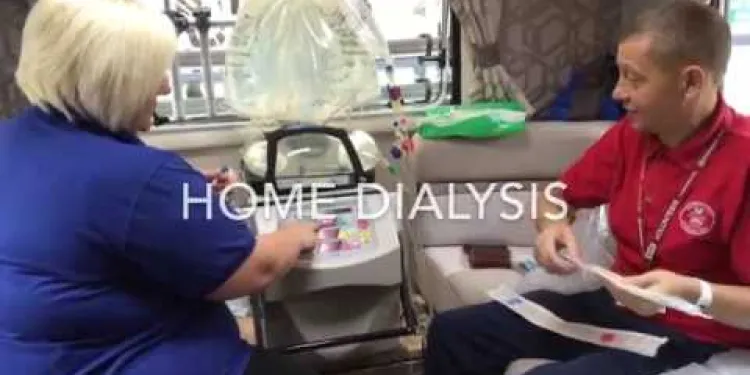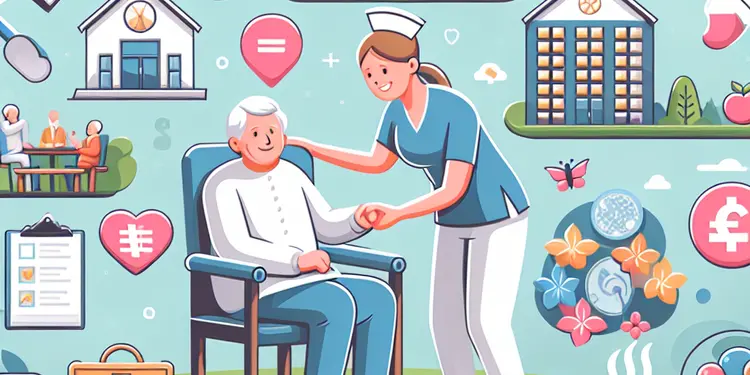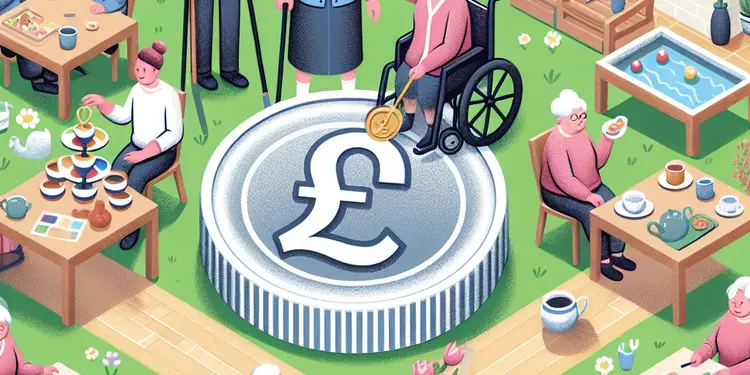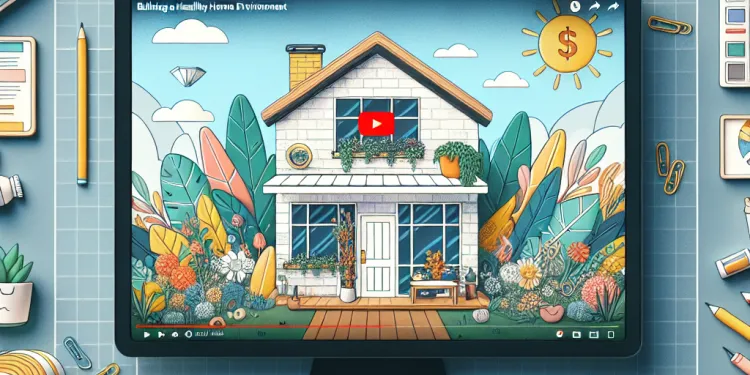Find Help
More Items From Ergsy search
-

Home Haemodialysis - Donna's story
Relevance: 100%
-

Home dialysis help for kidney patients
Relevance: 36%
-

How are care homes different from nursing homes?
Relevance: 30%
-

What are Care Homes?
Relevance: 29%
-

Fire Safety At Home
Relevance: 28%
-

Are there different types of care homes?
Relevance: 28%
-

The role of residential and nursing homes
Relevance: 28%
-

The role of residential & nursing homes
Relevance: 27%
-

What is the Warm Home Discount?
Relevance: 27%
-

Is the Warm Home Discount a loan?
Relevance: 27%
-

Are there home remedies for psoriasis?
Relevance: 27%
-

Do care homes provide medical care?
Relevance: 26%
-

What services do care homes provide?
Relevance: 26%
-

Who can live in a care home?
Relevance: 26%
-

Can I have a funeral service at home?
Relevance: 26%
-

Are dietary needs accommodated in care homes?
Relevance: 26%
-

Are activities provided for residents in care homes?
Relevance: 26%
-

What are the visiting hours for care homes?
Relevance: 26%
-

Can you keep the ashes at home in the UK?
Relevance: 26%
-

When is the Warm Home Discount applied?
Relevance: 26%
-

Can mixed exercises be done at home?
Relevance: 26%
-

Do I need a TV license for each TV in my home?
Relevance: 25%
-

Building a Healthy Home Environment
Relevance: 25%
-

How do bed bugs enter my home?
Relevance: 25%
-

Who is eligible for the Warm Home Discount?
Relevance: 25%
-

How do I choose a good nursing home?
Relevance: 25%
-

Can couples live together in a care home?
Relevance: 25%
-

What are the benefits of having spiders in the home?
Relevance: 25%
-

Are there home remedies for chickenpox?
Relevance: 25%
-

What should I do if I find a spider in my home?
Relevance: 25%
-

How do I choose a good bursing home
Relevance: 25%
-

How can I choose the right care home?
Relevance: 25%
-

How is the quality of care regulated in care homes?
Relevance: 25%
-

What is the value of the home charger installation grant?
Relevance: 25%
-

What qualifications do care home staff have?
Relevance: 25%
-

Can tenants apply for the Warm Home Discount?
Relevance: 25%
-

Is live-in care an alternative to nursing homes?
Relevance: 25%
-

Can air physiotherapy be done at home?
Relevance: 25%
-

Are there risks associated with home colorectal cancer tests?
Relevance: 25%
-

Are there any home remedies for impetigo?
Relevance: 25%
Home Haemodialysis - Donna's Story
Introduction
Home haemodialysis has provided numerous patients with the opportunity to manage their kidney condition from the comfort of their own homes. This story delves into the life of Donna, a resident of the United Kingdom, who has greatly benefited from this innovative medical treatment.
Diagnosis and Initial Challenges
Donna was diagnosed with chronic kidney disease several years ago. Initially, she had to visit a dialysis centre multiple times a week for her treatment. These regular trips were time-consuming and physically exhausting, impacting her daily life and reducing the time she could spend with her family.
The Transition to Home Haemodialysis
The turning point in Donna’s life came when her nephrologist suggested home haemodialysis. Donna was trained on how to use the dialysis machine, manage her treatment schedule, and handle any issues that might arise. Her transition was supported by a dedicated team who ensured she was comfortable and confident in managing her health at home.
Benefits and Personal Growth
Since starting home haemodialysis, Donna has seen significant improvements in her quality of life. She has more control over her treatment schedule, which has reduced stress and allowed her to engage more actively in her hobbies and family activities. Moreover, home haemodialysis has given Donna a sense of independence and empowerment as she actively manages her health.
Support and Resources Available
In the UK, patients like Donna can access various resources and support networks to facilitate home haemodialysis. The National Health Service (NHS) offers comprehensive training programs, equipment provision, and continuous support to ensure patient safety and effectiveness of the treatment.
Conclusion
Donna's story is a testament to the positive impact home haemodialysis can have on a patient's life. With proper training and support, it can transform the challenging journey of chronic kidney disease into a more manageable and empowered experience.
Home Haemodialysis - Donna's Story
Introduction
Home haemodialysis lets people with kidney problems get treatment at home. This is Donna's story. She lives in the United Kingdom and has found this treatment very helpful.
Diagnosis and Initial Challenges
Donna found out she had kidney disease a few years ago. At first, she had to go to a special centre many times a week. This took a lot of time and made her very tired. It was hard for her to do other things and be with her family.
The Transition to Home Haemodialysis
Things got better for Donna when her doctor said she could do dialysis at home. Donna learned how to use the dialysis machine and fix problems if they came up. She had a team helping her, so she felt good about doing dialysis at home.
Benefits and Personal Growth
Since doing dialysis at home, Donna feels better. She can choose when to do her treatment, so she feels less stressed. She has more time for her hobbies and family. Doing dialysis at home makes her feel strong and in control.
Support and Resources Available
In the UK, people like Donna can get help to do dialysis at home. The NHS gives training and support to make sure the treatment works well and is safe.
Conclusion
Donna's story shows how home haemodialysis can help people feel better. With good training and support, it can turn a tough journey into something much easier to manage.
Frequently Asked Questions
What is home haemodialysis?
Home haemodialysis is a treatment for kidney failure in which the patient performs dialysis at home rather than traveling to a clinic. It allows for more flexibility in scheduling and can often lead to better quality of life.
Is home haemodialysis safe?
Yes, home haemodialysis is considered safe when the patient is well-trained and closely monitored by their healthcare team. Regular training and ongoing support are provided to ensure safety and effectiveness.
Who is eligible for home haemodialysis?
Eligibility for home haemodialysis depends on several factors, including the patient’s overall health, ability to manage the equipment, and support from family or carers. A healthcare team will assess each individual case.
What equipment is needed for home haemodialysis?
Patients will need a dialysis machine, water treatment system, and dialysis supplies such as dialysate and tubing. The NHS typically provides this equipment, and patients receive training on how to use and maintain it.
How often do patients need to perform home haemodialysis?
The frequency of haemodialysis can vary but commonly involves treatments five to six times per week. Your healthcare provider will determine the best schedule based on your medical needs.
How long does each home haemodialysis session take?
A typical home haemodialysis session can take between 2.5 to 4 hours. The duration depends on the patient's treatment plan, which is tailored to their individual health requirements.
What training is required for home haemodialysis?
Patients and their carers undergo comprehensive training, which includes instruction on how to operate the dialysis machine, manage supplies, and handle potential complications. Training usually takes several weeks.
What are the benefits of home haemodialysis?
Benefits include greater flexibility and convenience, improved quality of life, a more comfortable environment, and better control over the dialysis schedule. Some patients also experience fewer side effects and better overall health outcomes.
Are there any disadvantages of home haemodialysis?
Some potential disadvantages include the need for significant training, the burden of managing equipment and supplies, and the possibility of complications that may require immediate attention. Support from healthcare providers is essential.
What support is available for home haemodialysis patients?
Patients have access to regular check-ups, 24/7 technical support, and assistance from a dedicated home dialysis team. This support ensures that any issues can be promptly addressed and that patients feel confident in managing their treatment.
Can home haemodialysis patients travel?
Yes, home haemodialysis patients can travel, but it requires careful planning. Arrangements must be made to transport and set up equipment, and it may be necessary to coordinate with a local dialysis clinic at the travel destination.
How does home haemodialysis impact daily life?
Home haemodialysis offers more flexibility, allowing patients to fit dialysis sessions around their daily schedule. This can lead to a more normal lifestyle, with more time for work, family, and personal activities.
Is home haemodialysis covered by the NHS?
Yes, home haemodialysis is covered by the NHS. The NHS provides the necessary equipment, training, and ongoing support at no cost to patients.
What should patients consider before starting home haemodialysis?
Patients should consider their ability to manage the treatment, the available support from family or carers, and the physical space in their home for the equipment. It’s important to discuss any concerns with the healthcare team.
Where can I find more information about home haemodialysis?
For more information, patients can consult their healthcare providers, visit the NHS website, or connect with kidney disease support groups and organisations. These resources can provide valuable information and support.
What is Home Haemodialysis?
Home haemodialysis is a way to clean your blood at home. It helps when your kidneys do not work well.
People use a special machine to do this. It helps take waste and extra water out of your blood.
You can do this with help from a nurse or family member.
Here are some tools to make it easier:
- Step-by-step guides with pictures
- Videos that show you how to use the machine
- Help from a nurse over the phone
Home haemodialysis is a way to clean your blood when your kidneys do not work well. You do this at home instead of going to a hospital. This can make it easier to plan your day and may help you feel better.
Is doing dialysis at home safe?
Yes, doing dialysis at home is safe. The person needs good training and doctors will check how they are doing. They will get help and support to make sure everything goes well.
Can I do dialysis at home?
Some people can do dialysis at home. You might be able to if:
- Your doctor says it's safe for you.
- You feel okay with doing it at home.
- You have someone to help you.
If you're thinking about this, ask your doctor or nurse. They can help you understand more!
To do dialysis at home, you need to meet some rules. Your doctor will check if you are healthy enough. You also need to know how to use the machines. It is helpful if family or carers can help you. A group of doctors and nurses will look at your case to see if home dialysis is right for you.
What do you need to do dialysis at home?
To do dialysis at home, you need some special things. Here is a list to help you:
- A dialysis machine: This is a big machine that cleans your blood.
- Water treatment system: This helps make the water safe for the machine.
- Access needles or catheter: These help get your blood to the machine.
- Dialyzer: A filter that helps clean your blood.
- Other supplies: Like tubes, tape, and cleaning solutions.
Remember, you will need help to set up these things, so ask a nurse or doctor. They can teach you how to use them. You might also use apps or videos to learn more.
People who need dialysis will use a special machine. This machine cleans their blood. They also need clean water and special supplies to use with the machine. The NHS usually gives these things to patients. Patients also get lessons to learn how to use and take care of everything.
How often do people need to do home haemodialysis?
Home haemodialysis is when people clean their blood at home. This helps when their kidneys are not working well.
People usually do home haemodialysis 3 to 6 times a week. A doctor will say how many times is best for you.
To make home haemodialysis easier, you can:
- Ask a nurse to show you how to set up the machine.
- Use a calendar to remember the days you need to do it.
- Have a family member or friend help you.
Haemodialysis is a treatment that helps clean your blood. You may need to have this treatment five to six times each week. Your doctor will tell you how often you should have it, because it depends on what your body needs.
How long does it take to do dialysis at home?
Doing dialysis at home takes a few hours. It can take about 3 to 4 hours.
Sometimes, it might take a little more time or a little less.
You can ask someone to help you keep track of time. Using a timer or alarm clock can help you remember.
A home dialysis session is when a machine helps clean your blood. This can take 2.5 to 4 hours. How long it takes depends on what your doctor says is best for your health.
What training do you need for dialysis at home?
Patients and their helpers get lots of training. They learn how to use the dialysis machine, take care of the supplies, and know what to do if something goes wrong. This training takes a few weeks.
Why is doing dialysis at home good for you?
Doing haemodialysis at home can help you in many ways. Here are some good things about it:
- You can choose when to do your dialysis. This can make your daily routine easier.
- You don't have to travel to the hospital often. This saves you time and energy.
- You might feel better because you can do dialysis more often.
- You have more freedom to do other things you like.
If reading is hard, you can ask someone to read to you or use a tool that reads the text out loud. This can help you understand better.
There are many good things about this. It is more flexible and easy. It makes life better. You can be more comfy and decide the best time to do dialysis. Some people feel better and have fewer side effects.
Are there any downsides to doing dialysis at home?
Some people clean their blood at home because their kidneys are not working well. This is called home dialysis. Here are some things to think about:
- Space: You need a special machine that takes up space. Do you have enough room at home?
- Help: It might be good to have someone help you. Is there someone who can help?
- Training: You need to learn how to use the machine. Are you okay with learning?
- Electricity and Water: The machine needs power and water. Do you have these at home?
If you have questions, talk to your doctor. It can help to write down your thoughts or use a digital tool like a reminder app to help keep track of your schedule.
There are some downsides. You need a lot of practice. You have to take care of tools and things. Sometimes things can go wrong and need fixing fast. It helps to have doctors and nurses to support you.
What help can people get if they do dialysis at home?
Here are some ways to get help:
- Ask a nurse or doctor if you have questions.
- You can use special tools to make dialysis easier.
- You can ask for someone to visit and help you.
- There might be a support group you can join.
- Family and friends can help you too.
People can have regular check-ups with their doctor. They can also get help anytime, day or night, if they have a problem. There is a special home dialysis team to help them. This team makes sure any problem is fixed quickly. People feel safe and know how to take care of their treatment.
Can people doing haemodialysis at home go on trips?
Yes, people who do dialysis at home can still go on trips. But they need to plan ahead. They have to think about how to move their equipment. They might also need to talk to a dialysis clinic where they will travel.
How does doing haemodialysis at home change daily life?
Doing haemodialysis at home can change how you live each day. Here is how:
- You need to set time to do your treatment at home.
- You may feel tired after treatment, so plan to rest.
- You need space at home for the machine and supplies.
- Family or friends can help you if needed.
- Talk to your doctor or nurse if you have questions.
To help understand, you can:
- Use picture guides or videos.
- Ask someone you trust to explain.
- Write down questions for your healthcare provider.
Doing dialysis at home gives you more choices. You can do it when it suits you best. This means you can have a more normal life. You will have more time for work, being with family, and doing things you like.
Does the NHS pay for home haemodialysis?
Yes, the NHS does pay for home haemodialysis. If you need to have dialysis at home, the NHS will help with the costs and support you.
If you find reading hard, you can:
- Ask someone to read it to you.
- Use a read-aloud app or tool.
- Highlight or underline important words.
Yes, the NHS pays for home dialysis. They give you the machines and teach you how to use them. They also help you while you use it, and it is all free for patients.
What should you think about before starting home haemodialysis?
Before you start doing haemodialysis at home, here are some things to think about:
- Do you have enough space for the machine and supplies?
- Can you or someone else be trained to use the machine safely?
- Are you comfortable doing the treatment at home?
- Will you have support if you need help?
You can use tools like pictures, videos, or talking to a nurse to help understand more.
If you need treatment, think about these things:
- Can you handle the treatment?
- Do you have family or helpers to support you?
- Do you have enough space at home for the equipment?
It’s really important to talk about any worries with your doctor or nurse.
Where can I find more information about home haemodialysis?
Would you like to learn more about doing dialysis at home?
You can:
- Ask your doctor or nurse for help.
- Visit your local library to find books.
- Search the internet for easy-to-read websites.
- Watch videos online about home dialysis.
If reading is hard for you, try using:
- Text-to-speech tools that can read text out loud.
- Online videos with subtitles or sign language.
Remember, it's okay to ask for help if you need it.
If you want to know more, you can:
- Talk to your doctor or nurse.
- Look at the NHS website.
- Join kidney support groups.
These can help you learn and get support.
Useful Links
Have you found an error, or do you have a link or some information you would like to share? Please let us know using the form below.
-->
This website offers general information and is not a substitute for professional advice.
Always seek guidance from qualified professionals.
If you have any medical concerns or need urgent help, contact a healthcare professional or emergency services immediately.
Some of this content was generated with AI assistance. We’ve done our best to keep it accurate, helpful, and human-friendly.
- Ergsy carfully checks the information in the videos we provide here.
- Videos shown by Youtube after a video has completed, have NOT been reviewed by ERGSY.
- To view, click the arrow in centre of video.
- Most of the videos you find here will have subtitles and/or closed captions available.
- You may need to turn these on, and choose your preferred language.
- Go to the video you'd like to watch.
- If closed captions (CC) are available, settings will be visible on the bottom right of the video player.
- To turn on Captions, click settings .
- To turn off Captions, click settings again.
More Items From Ergsy search
-

Home Haemodialysis - Donna's story
Relevance: 100%
-

Home dialysis help for kidney patients
Relevance: 36%
-

How are care homes different from nursing homes?
Relevance: 30%
-

What are Care Homes?
Relevance: 29%
-

Fire Safety At Home
Relevance: 28%
-

Are there different types of care homes?
Relevance: 28%
-

The role of residential and nursing homes
Relevance: 28%
-

The role of residential & nursing homes
Relevance: 27%
-

What is the Warm Home Discount?
Relevance: 27%
-

Is the Warm Home Discount a loan?
Relevance: 27%
-

Are there home remedies for psoriasis?
Relevance: 27%
-

Do care homes provide medical care?
Relevance: 26%
-

What services do care homes provide?
Relevance: 26%
-

Who can live in a care home?
Relevance: 26%
-

Can I have a funeral service at home?
Relevance: 26%
-

Are dietary needs accommodated in care homes?
Relevance: 26%
-

Are activities provided for residents in care homes?
Relevance: 26%
-

What are the visiting hours for care homes?
Relevance: 26%
-

Can you keep the ashes at home in the UK?
Relevance: 26%
-

When is the Warm Home Discount applied?
Relevance: 26%
-

Can mixed exercises be done at home?
Relevance: 26%
-

Do I need a TV license for each TV in my home?
Relevance: 25%
-

Building a Healthy Home Environment
Relevance: 25%
-

How do bed bugs enter my home?
Relevance: 25%
-

Who is eligible for the Warm Home Discount?
Relevance: 25%
-

How do I choose a good nursing home?
Relevance: 25%
-

Can couples live together in a care home?
Relevance: 25%
-

What are the benefits of having spiders in the home?
Relevance: 25%
-

Are there home remedies for chickenpox?
Relevance: 25%
-

What should I do if I find a spider in my home?
Relevance: 25%
-

How do I choose a good bursing home
Relevance: 25%
-

How can I choose the right care home?
Relevance: 25%
-

How is the quality of care regulated in care homes?
Relevance: 25%
-

What is the value of the home charger installation grant?
Relevance: 25%
-

What qualifications do care home staff have?
Relevance: 25%
-

Can tenants apply for the Warm Home Discount?
Relevance: 25%
-

Is live-in care an alternative to nursing homes?
Relevance: 25%
-

Can air physiotherapy be done at home?
Relevance: 25%
-

Are there risks associated with home colorectal cancer tests?
Relevance: 25%
-

Are there any home remedies for impetigo?
Relevance: 25%


